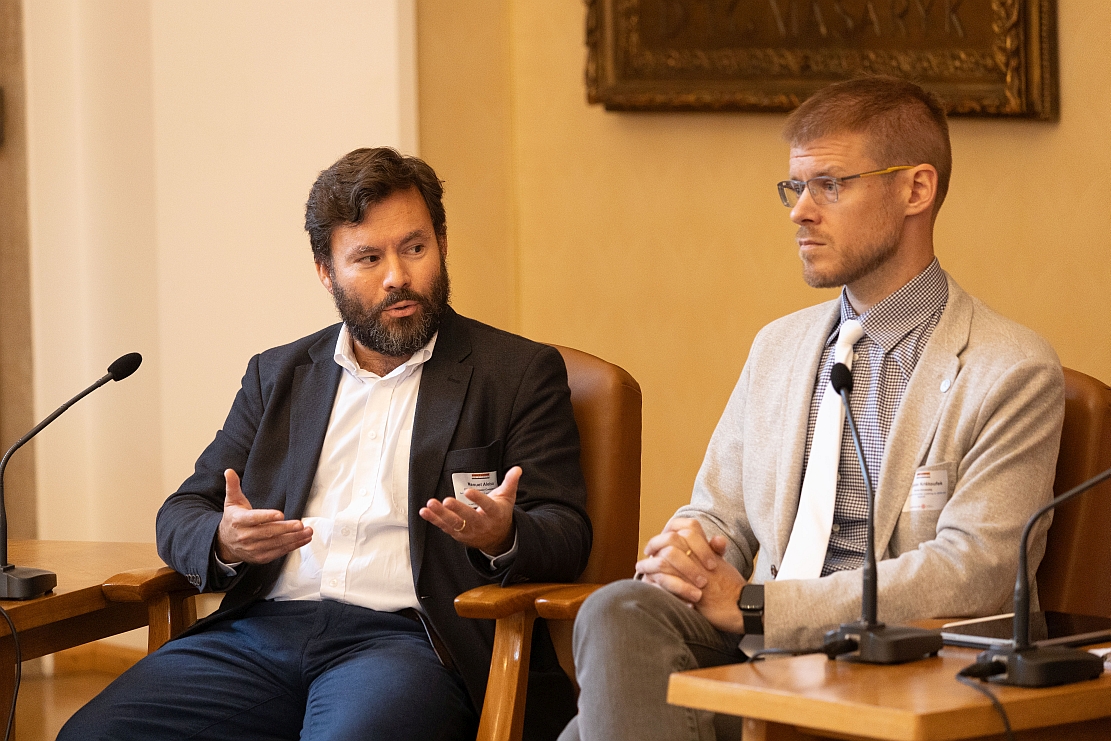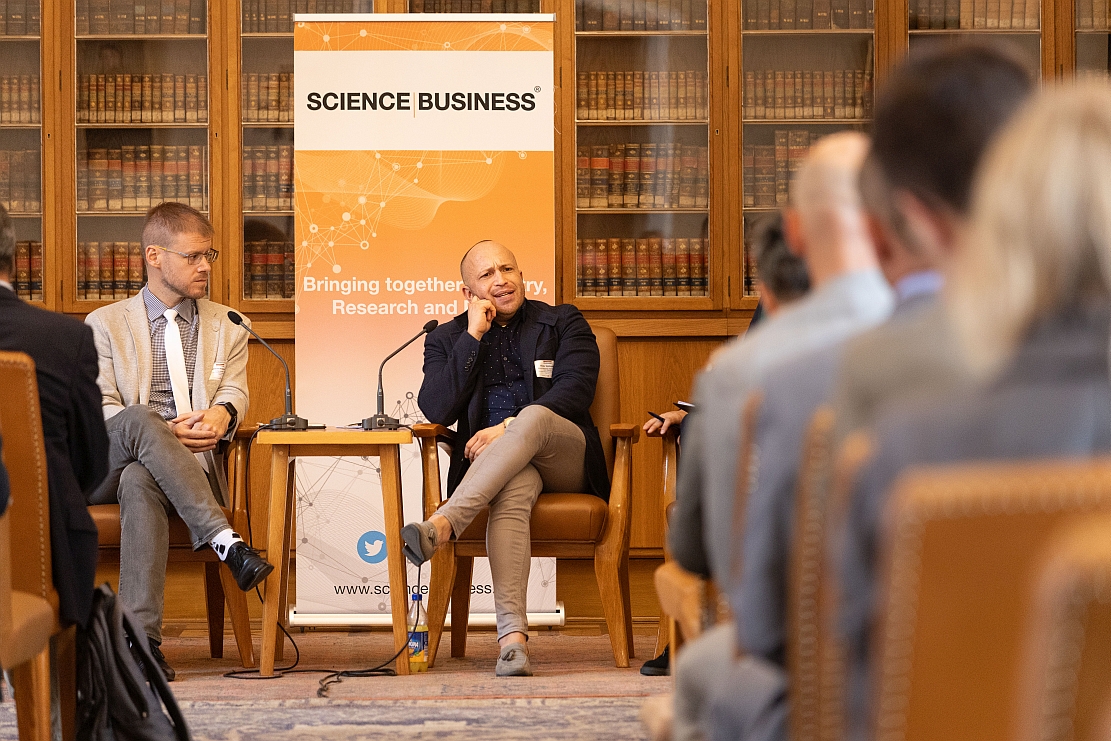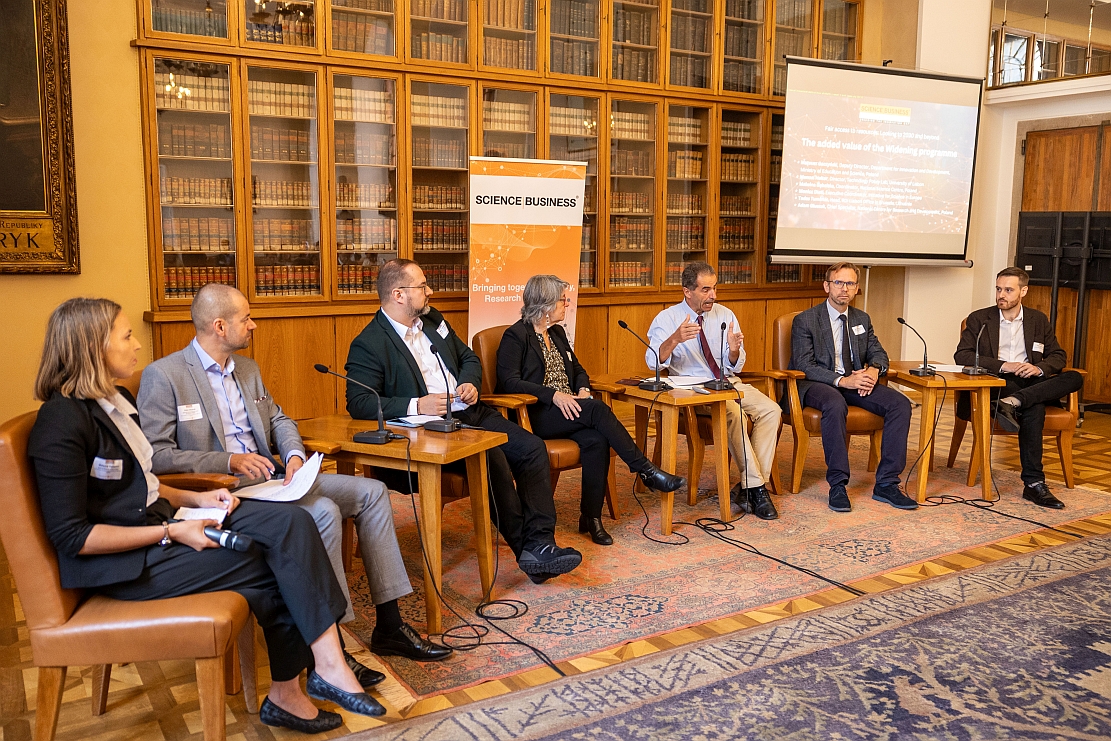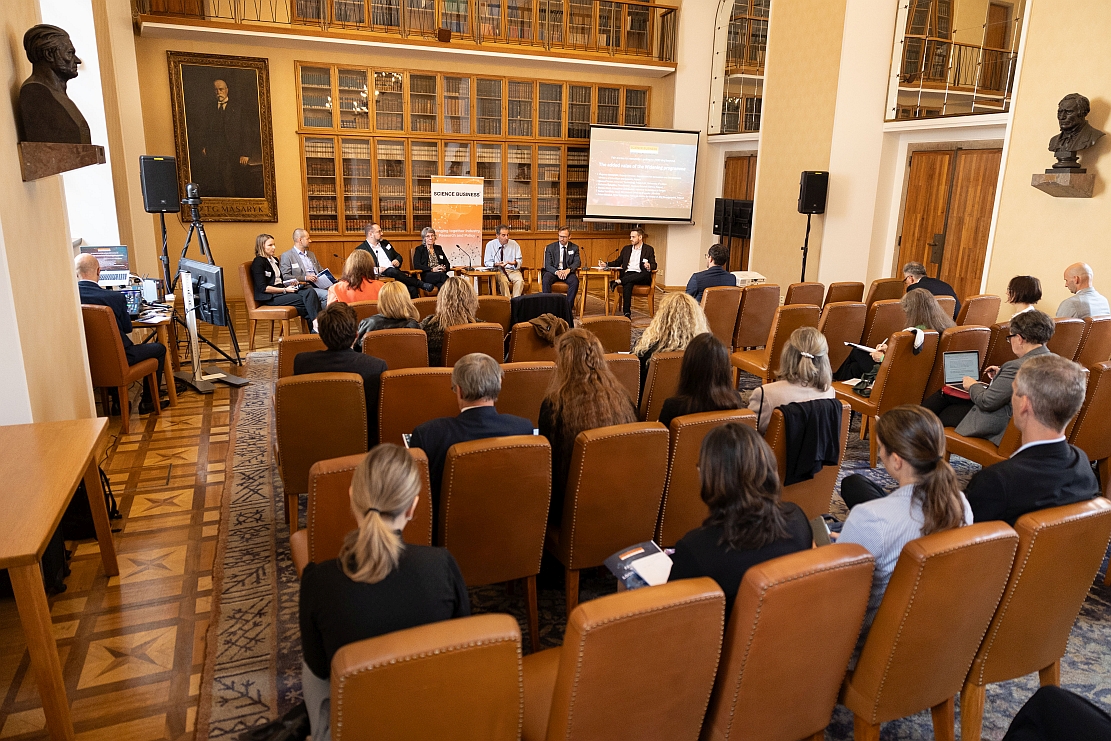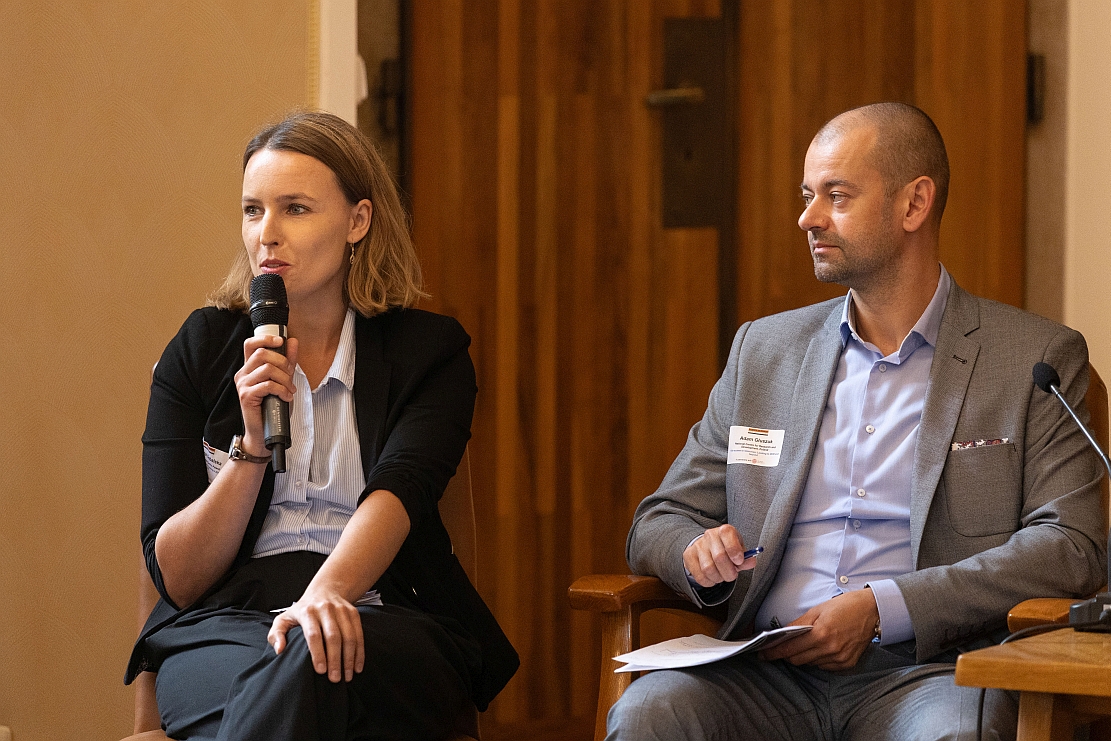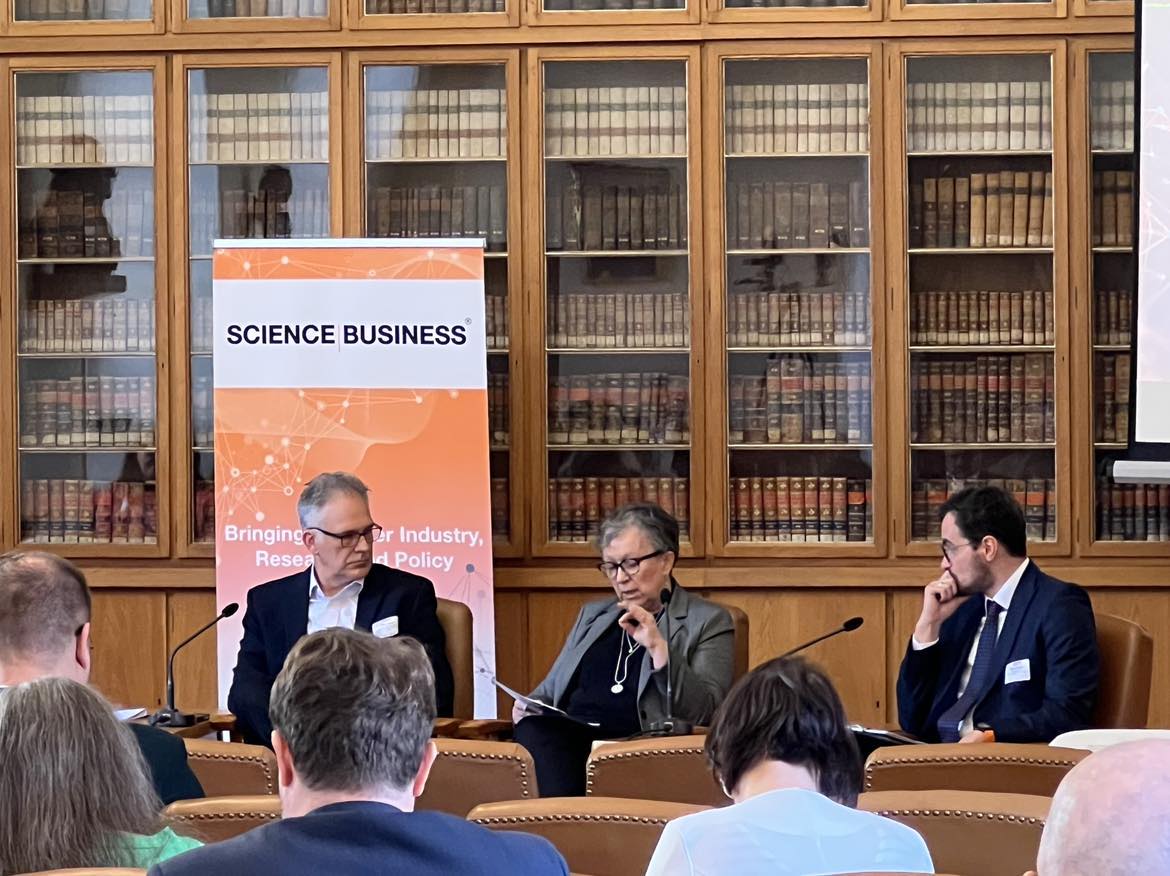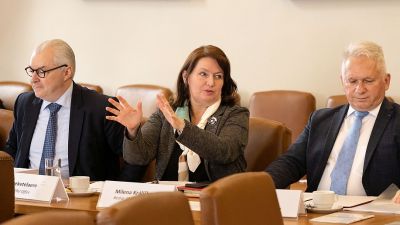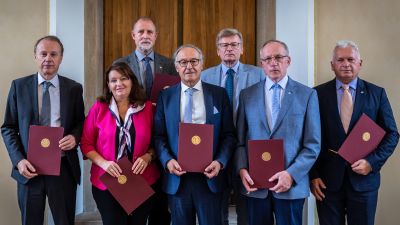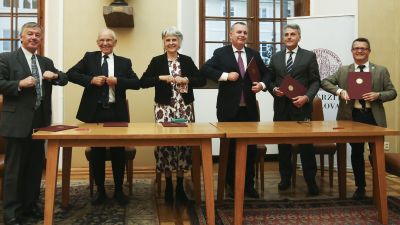This Tuesday, Charles University hosted a much awaited conference organised by Science|Business and the Science|Business Widening initiative. The event was part of a series of debates on how to transform the Widening Programme as European and national policy makers shape the next EU Framework Programme for research and innovation.
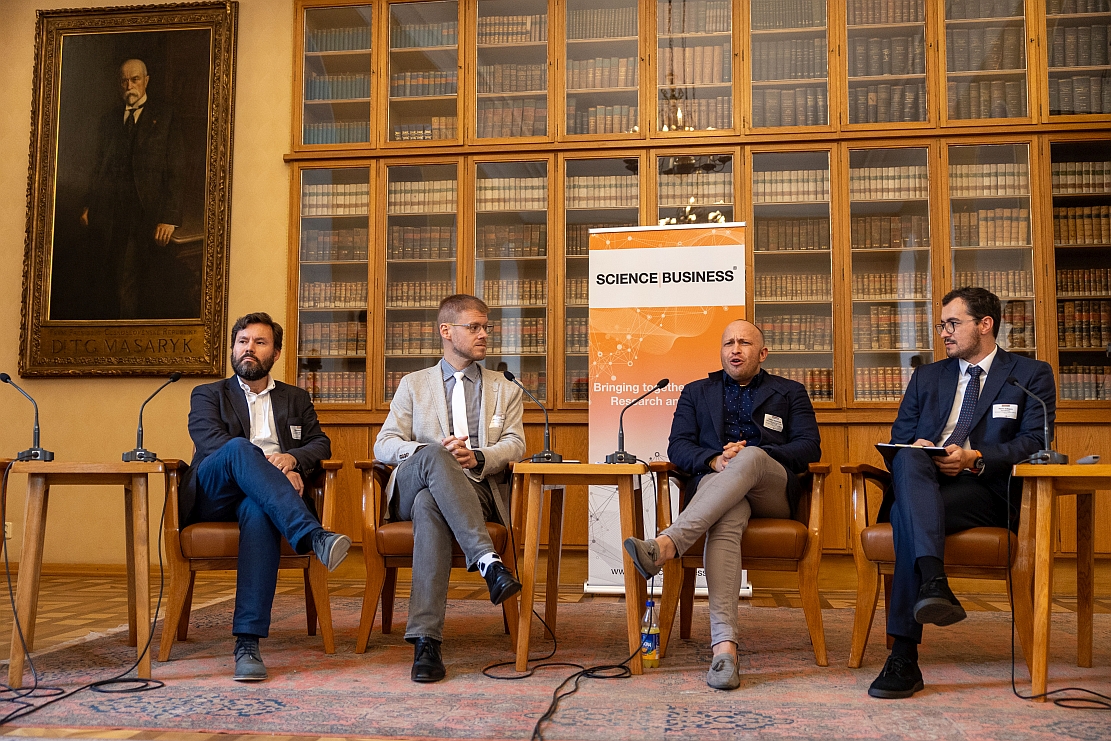
Participants in the opening bloc of Tuesday's conference at CU. From left: M. Aleixo, L. Krištoufek, V. Velčovský and moderator Florin Zubascu.
CU was proud to both host and to actively take part in the conference, held in the Hall of Patriots at the historic Carolinum building, bringing together key speakers and notable figures from the EC to public industry and from university management to academics. Many of whom feel strongly that – with improvements and rebalances in funding - there is room for improvement and extensive growth in research and innovation precisely in the eastern and southern regions of Europe (ie. 10 countries that acceded to the EU almost 20 years ago) and the additional three that joined the EU since.
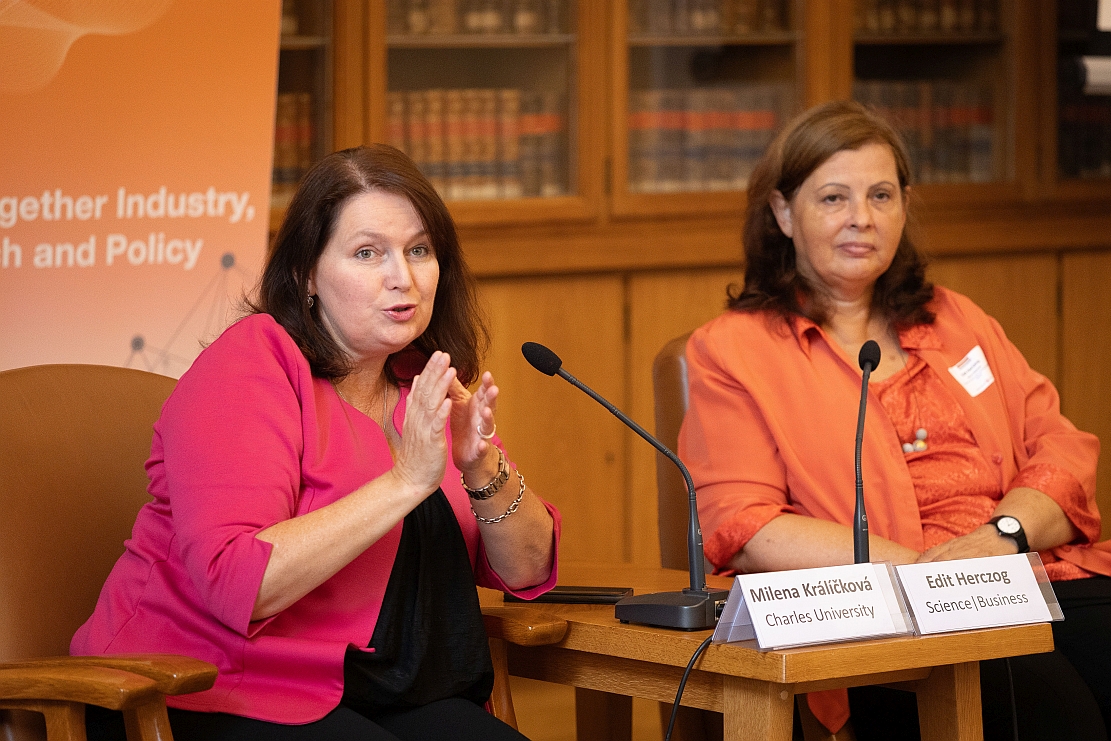
CU Rector Milena Králíčková and Science|Business's Edit Herczog. The rector set the tone for the discussion as she welcomed all participants.
Opening remarks
The rector of Charles University, Milena Králíčková, welcomed attendees on Tuesday, wishing everyone a successful event. Before ‘giving the floor’ to invited speakers, she briefly outlined how in line with widening aims the university is.
“We are a 675-year-old university established in the 14th century, which in the beginning had just four faculties: medicine, law, arts and theology. It’s true: since the beginning, our university was established to bring people together and to bring people from all over Europe to Prague. [This aim was outlined in the very decree or founding document] by Charles IV, the Czech king and Holy Roman Emperor… Being an international institution, striving for excellence and widening our activities, is really in our DNA.”
The rector and her team have continuously worked to improve CU as a 21st century research university [Prof. Králíčková was CU's vice-rector for Education for eight years also in the previous CU management - ed. note] and CU is not only a member of the prestigious 4EU+ Alliance but is a member of the CE7 which networks and works closely with LERU. The understanding is that supporting universities in the former eastern bloc and supporting R&I development is a 'win-win' for everyone. The problem? The numbers are currently still lagging significantly, comparatively speaking, in newer member states for a myriad of reasons: from lack of confidence or a deficit in researchers to - in worse cases - a lack of interest or questions of capability or preparedness to bring big projects in (not to be confused with excellence in actual research). Those issues were a large part of the discussion at the conference Tuesday.
We know success when we see it
Václav Velčovský, Director General, EU Operational Programmes section, Ministry of Education, Youth and Sports, Czech Republic, Ladislav Krištoufek, the Vice-Rector for Research at Charles University and Manuel Aleixo, Head of Unit, ERA and Innovation, DG RTD, at the European Commission were members of the first panel in the opening section.
Vice-Rector Krištoufek described the Czech landscape, with the exception of some research universities, as still not being at the level to accrue all the funds needed, and pointed to systemic changes needed that were country-specific and not just at universities but research institutions. Václav Velčovský made clear, in his view, just how important mobilities had been in the Czech success story – from Erasmus one- or two- semester stays to other mobility initiatives. He highlighted the coming importance of microcredentials – which CU is pursuing as a key pillar in improving and offering different types of learning and expertise. Here is what he had to say:
“We are building – or should build in the future – pathways using microcredentials through universities, through different types of learning. This is the kind of environment [we want] and we have these tools but we need to improve in areas where we are lagging. Not in higher education, but secondary schools, for example, where mobility is far less widespread.”
Science|Business, the organiser of the conference and similar events publicising the need to raise awareness, noted on its webpage that “in the third year of Horizon Europe, it is too early to draw any significant conclusions on its performance. However, several analyses already point to some of the things the European Commission could do to improve the programme in the second half of its lifetime.” Potential improvements were very much at the forefront of the discussion, as well as new or underlying problems, some of them semantic, some of them systemic. Science|Business senior advisor Edit Herczog told Forum the importance of conferences like the one hosted on Tuesday, was to promote discussion and bring underlying issues to the table:
“The added value of the conference is to get the word out, to raise awareness, to understand the terms being used and better understand their content. So I think that is one benefit: many people have different angles of what Widening projects should be or even which regions most need to benefit. Many issues were raised but they all meet at the same imperative: to think about the same semantic meaning and maybe discard some of the old terminology before FP 10. We need to see which words gain prominence in the word cloud whether we are talking about European leadership, science-based decision making and how the grand challenges can be better met.”
Even the expression the Widening seems to have taken on new unintended meaning in some circles…
“Absolutely. If you look at the Widening in the original language of the European Union, it was one dimension of the European dream. The dream was about enlargement, to increase participation and deepen cooperation. In that sense, I think it is still a fresh expression. Looking into research funding, when it became a kind of instrument, it is not equal to the Widening I described before. The aim was to widen participation and excellence but when it comes to some of the newer EU countries they are still lacking the necessary infrastructure to perform their excellence. And it doesn’t mean physical, it can be digital, it can be networking, communication. I rather call this Widening an investment programme – to build the necessary framework to capitalise on existing excellence better.”
Not long ago, I interviewed the secretary-general of LERU, Kurt Deketelaere, and he also stressed the importance of support for universities in these areas, as LERU partners with the CE7.
“It is difficult to comment on different organisations that are not present. But yes, you need both legs to move. In other words, you need the EU 13 and the EU 14 both.”
Room for improvement
There is some way to go before something like a better harmony is achieved. Underlying problems include the fact that the 13 acceding countries since 2004 had not fully capitalised on their potential when it came to funding - far from it - an issue looked at in-depth by Vladimír Vojtěch, an analyst at the National Information Centre for European research, Technology Centre Prague. His By the numbers: An overview of EU13 participation in Horizon Europe presentation bolstered or prompted further discussion in blocs that followed, including Horizontal challenges and the way forward which included speakers such as Lucyna Woźniak, Vice-Rector for Research Strategy and International Relations, Medical University of Lodz, Zlatuše Novotná, Head, Strategic Partnerships & International Relations, CEITEC and Allen Weeks, CEO, ELI; Expert Group Member, ERIC.
While Lucyna Woźniak felt that more tailor-made solutions were needed for funding, Allen Weeks suggested outcomes always come down to people and individual drive as well as approach. The story could be summed up as ‘opportunity is everywhere’ or the red car theory currently making the rounds online.
“The story goes that Baťa sent two salesman to Africa in the 1930s. One of the salesmen sent back news that there was no market for shoes as nobody there wore them, while the other sent back the answer “There is a huge market for shoes here because nobody wears shoes”! My point is that in the Widening by the EC in countries in the East and South, there is a tremendous opportunity for growth.”
Q&A with Allen Weeks
After the conference, Forum spoke briefly with Allen Weeks, the director-general of ELI who has been based in Europe since 1992, about some of the issues raised at the event.
A lot of aspects of EU funding were unpacked at the conference when it comes to the Widening. Could you elaborate on where you think some of the opportunities lie?
I’ll give an example: for us at ELI we are always going to be confronted with the fact that we need good qualified people – both to use the facility and also those to help us run it. And it’s clear that in the laser sector, where we are very strong, there is a shortage of people, not just in Europe but around the world. So often, when I am asked by stakeholders how should we attract people from western Europe to come to Czechia or Hungary to work my thing is ‘Maybe we should try and attract young people in the region already, train them and grow the pie here’. For us, we depend on universities like Charles University or the Czech Technical University: they are our pipeline where new people are coming from and it is where we expect them to come from.
We expect universities to find people right out of high school who are bright and working in this field and we like to partner with universities early, at the Masters level even before PhD level and we have an internship for undergrads to come and spend time with us. But we have to grow the talent pool: there have to be opportunities and reasons to stay here.
When it comes to grappling for funds between the Widening countries, there seems to be a push-and-pull between one-size-fits-all or a more tailored approach. Is that a fair assessment?
The strength of the European framework programme has always been building cooperating across borders and creating opportunities for institutions to work together and collaborate. That in a sense is one size fits all but I think the better way of describing it is ‘equal opportunity’. FP9 already started to address issues for specific developmental countries and I don’t think that is a bad thing, I think that is facing reality. But even within countries there are different tiers; so maybe, creating programmes that are a mix of national and European funding that would be a little bit more tailor-made for specific countries could have an effect. It doesn’t mean taking big chunks out of the budget but a little bit of money could go a long way in helping some get on the same level as other countries.
There is always politics whether on the European or national level. Czechia is undergoing a kind of financial crunch now and universities and funding of education and research and science always seem under threat in such scenarios. How do you ‘inoculate’ universities, or how should they help themselves, at times when there is a danger of public spending cuts?
Fortunately, in the Czech Republic you have at least a decade of solid investment in research and you have a prime minister and research minister who both come from the research sector, so I think they at least will fight to preserve ongoing funding. I would say it’s not a cost, it’s an investment. There are certain things that you simply have to view as an investment in the future. If you expect to solve some of the issues or problems we are in, you have to put or preserve the money in certain areas.
If we don’t, we will find ourselves stuck going through the same loop over and over again. I think it’s a mindset; it’s not a cost. And we should treat it like an investment – we should expect some kind of return at some point, so you can hold people accountable. But at the same time, you don’t just cut. It’s a common good, it’s not a common service. In the 21st century you have to invest in this and that is the cost of business.
In the closing remarks, we heard a summary of the importance of this kind of event: you get officials from the EU level, regional actors, the university management, the university body including researchers all talking together. Does the discussion trickle down or also ‘trickle up’ and reach the decision-making level?
It does. In my experience in the Czech Republic over more than 12 years I think that officials here are engaged and are engaged at many different levels in European science. There is always a need for more resources but that is also due to the fact things here have grown and become well-established and you want to maintain and sustain that over time. There is a good level of engagement. I’ve seen a lot of countries in Europe and worked in most of them in terms if research and I think Czech leadership in this field will continue. I don’t see the Czech Republic or Brno or Prague specifically as ‘developing regions’ but already as competitive in Europe.


